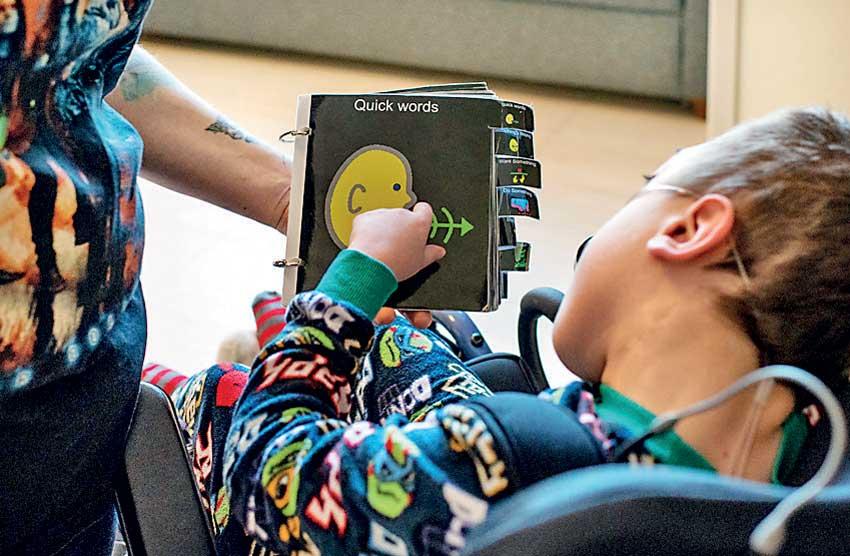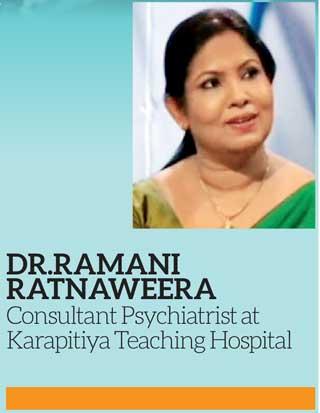08 Oct 2021 - {{hitsCtrl.values.hits}}

 “Children with special needs have a high risk of developing mental health issues particularly because they are isolated,” opined Consultant Psychiatrist at Karapitiya Teaching Hospital Dr. Ramani Ratnaweera.
“Children with special needs have a high risk of developing mental health issues particularly because they are isolated,” opined Consultant Psychiatrist at Karapitiya Teaching Hospital Dr. Ramani Ratnaweera.
“Rehabilitation centres aren’t functioning and this causes a decline in education and it will affect their emotional wellbeing. By going to the community these children experience a certain degree of emotional development.
However, due to the pandemic, children with neurological, neuromuscular and developmental disorders have been equally affected. As a result, caregivers experience much anxiety and depression. People are not talking about this community and they are unable to access online education. Special needs teachers cannot be replaced by parents as well.
 “On the other hand these children are more susceptible to viral infections and therefore parents are worried about taking them outdoors,” she continued. “As special needs children are isolated, it will affect other children around them and they will become anxious and show aggressive behaviours. Unlike on a normal day, children are confined to their homes and the family will feel stressed out,” she explained.
“On the other hand these children are more susceptible to viral infections and therefore parents are worried about taking them outdoors,” she continued. “As special needs children are isolated, it will affect other children around them and they will become anxious and show aggressive behaviours. Unlike on a normal day, children are confined to their homes and the family will feel stressed out,” she explained.
However, Dr. Ratnaweera said that there were less COVID positive cases being reported among special needs children. “This could be because they have had limited contacts during this period. But when you’re confined to a small space with a mental or physical disability it’s a bigger struggle. They will express their emotions by behaving abnormally or aggressively. On the other hand most online platforms do not have assistive technology to support children who are visually impaired or those who have hearing difficulties,” she added.
She further said that social interaction is essential for children with developmental disorders such as autism. “Therefore there should be some communication among children and teachers and this kind of a situation isn’t helpful. As a result their mental and physical health will deteriorate. There are children with Down’s Syndrome who will feel anxious as they are confined to their homes. Parents also cannot do much and as a result they will experience developmental and intellectual delays. These children cannot understand the current situation as their ability to understand is low. Therefore they will feel lost. Parents too are unable to communicate with them,” Dr. Ratnaweera said.
There have also been instances when either of the parents or both parents, who are the sole caregivers of these children, were taken away for quarantine. “When left alone these children will be in a dilemma and eventually they will develop depression and anxiety as they are unable to understand what’s happening around them. Therefore some healthcare workers should be given the responsibility of looking after these families. There has to be a holistic approach to look after their basic needs, support their mental wellbeing and ensure that these children are given some activities with community groups while adhering to safety precautions. At the moment this community is neglected from society and we need to give in more energy and strength and assist them in this situation,” she said.
Dr. Ratnaweera also observes extreme levels of exhaustion on the part of caregivers. “They don’t have access to services like during the pre-Covid period and according to some studies caregivers have reported of depression and anxiety,” she added.
But with the government prioritizing on vaccinating special needs children, Dr. Ratnaweera feels that they will be able to get back to their ‘new normal’ soon. “When children visit these centres, irrespective of the disability, they get together in groups and engage in various activities. Parents also get a chance to relax as they also have their own groups. They are given lectures about family life, guidance on how to conduct themselves and how to reduce stress and anxiety. The pandemic is going to stay for sometime and the best solution is to speed up vaccination and allow these children to get back to their normal lives while adhering to safety precautions,” Dr. Ratnaweera underscored.
21 Dec 2024 3 minute ago
21 Dec 2024 9 minute ago
21 Dec 2024 1 hours ago
20 Dec 2024 9 hours ago
20 Dec 2024 20 Dec 2024